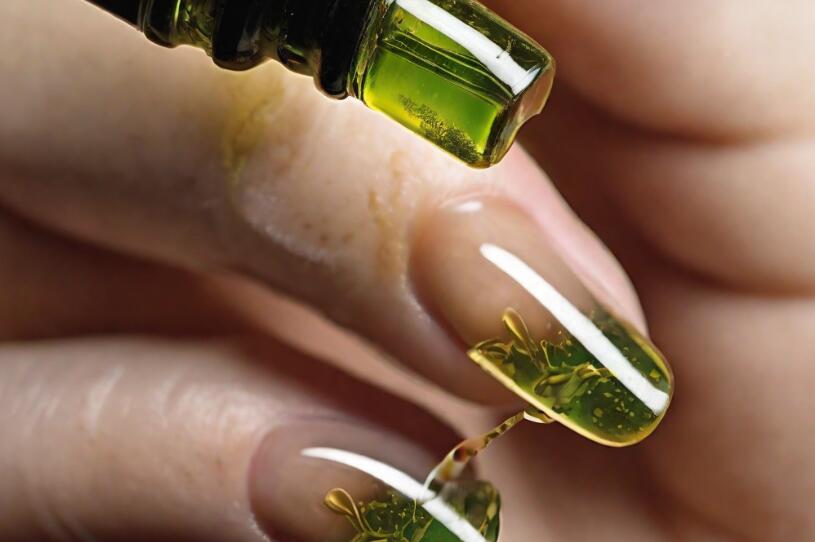Struggling with unsightly nail fungus can be both frustrating and embarrassing. Tea tree oil, known for its antifungal properties, is a popular natural alternative to harsh chemicals. This guide delves into how tea tree oil could be your ally in fighting fungal infections and restoring the health of your nails. Discover the power of nature’s remedy as you read on!
Key Takeaways
- Tea tree oil is a natural remedy that can help fight nail fungus, with its antifungal properties shown to be effective in some studies.
- When using tea tree oil on nails, it’s important to apply it correctly and watch for any skin reactions. Always do a patch test first.
- Other home remedies like oregano oil, coconut oil, and apple cider vinegar may help with nail fungus but talk to a doctor if the problem gets worse or doesn’t go away.
- For serious infections or long-lasting problems, see a doctor who might suggest stronger treatments or medication.
- Natural remedies like tea tree oil can be part of caring for your nails, but remember good foot hygiene and regular checks are also key.

Overview of Nail Fungus
Nail fungus, also known as onychomycosis, is a common condition caused by fungal infection. Symptoms include thickened, discolored nails and potential pain or discomfort. Conventional treatments often include medicated nail creams or oral antifungal medications.
Causes and symptoms
Nail fungus starts when a tiny germ called a fungus gets into your nail through a cut or crack. Your toes are often warm and damp, which is just what fungi like. This can cause the nail to change color, and get thicker, and it might hurt too.
If you don’t wash and dry your feet well or if you have diabetes, you’re more likely to get it.
Your nails can tell you if there’s a fungus problem. They might look yellow or brown and could break easily. Some people say their nails smell bad, too. It’s important for foot health to watch for these signs so you can treat them fast with things like tea tree oil or see a doctor if they get worse.
Next up: What do we know about using tea tree oil on this pesky problem? Let’s find out!
Conventional treatments
Nail fungus is commonly treated with oral antifungal medications, such as terbinafine or itraconazole. These medications are often taken daily for several months and may have potential side effects, including liver damage.
Another conventional treatment is the use of topical antifungal solutions or creams, which are applied directly to the infected nails. In severe cases, the affected nail may need to be surgically removed to allow direct application of an antifungal solution.
However, these treatments may not always be effective and can take a long time to show results.
Does Tea Tree Oil Work for Nail Fungus?
Research findings have shown that tea tree oil has antifungal properties, making it effective for treating nail fungus. It has been found to be particularly effective against certain types of fungus, such as dermatophytes and yeast infections.
Research findings
Studies have shown that tea tree oil has antifungal properties, making it effective in treating nail fungus. The oil can inhibit the growth of various fungi, including those that cause nail infections.
It is also believed to penetrate the nail and reach the site of infection. In a clinical trial, participants experienced an improvement in their nail fungus after applying tea tree oil topically for several weeks.
The effectiveness of tea tree oil varies depending on the type of fungus and individual response. While more research is needed to establish its full potential, current findings suggest that tea tree oil could be a promising natural remedy for addressing fungal nail infections without the side effects associated with conventional treatments.
Effectiveness on different types of fungus
Studies have shown that tea tree oil can be effective in treating different types of nail fungus, including dermatophytes and yeast infections. The antifungal properties of tea tree oil make it a promising natural remedy for combating various fungal strains found in nails.
Its antimicrobial effects can help inhibit the growth of fungus and promote healthier nails, making it an appealing option for those seeking alternative treatments.
Now let’s explore how to use tea tree oil effectively for nail fungus treatment.

How to Use Tea Tree Oil for Nail Fungus?
To use tea tree oil for nail fungus, it is important to properly apply and dose the oil onto the affected nails. Additionally, it is crucial to be aware of potential risks and side effects associated with its usage.
Proper application and dosage
Apply tea tree oil directly to the affected nail using a clean cotton swab or pad. Use enough oil to cover the entire surface of the nail and the surrounding skin. It’s important to be consistent with application, so do this twice a day, once in the morning and once at night.
Remember that a little goes a long way, so there’s no need to use excessive amounts of tea tree oil on your nails.
As for the dosage, start with a small amount and gradually increase if needed. A few drops are usually sufficient for each application. Ensure that you don’t exceed this amount as it may cause skin irritation.
Potential risks and side effects
Before using tea tree oil for nail fungus, it’s important to be aware of potential risks and side effects. Although rare, some people may experience skin irritation or allergic reactions when using tea tree oil topically.
Symptoms can include redness, itching, or a rash. It’s crucial to do a patch test before applying tea tree oil to your nails to ensure you don’t have an adverse reaction. Additionally, if you accidentally ingest tea tree oil, it can lead to stomach upset and other related symptoms.
Always use the recommended dosage and consult a healthcare professional if you experience any concerning side effects.
Other Natural Remedies for Nail Fungus
Explore other natural remedies for nail fungus, such as oregano oil, coconut oil, and apple cider vinegar for alternative treatment options. These remedies can be used in conjunction with tea tree oil or on their own to help combat nail fungus.
1. Oregano oil
Oregano oil is another natural remedy that has been explored for its potential to treat nail fungus. It contains a compound called carvacrol, which has been found to have antifungal properties.
Some research suggests that oregano oil may inhibit the growth of fungi, including those that cause nail infections. Its application involves diluting the oil and applying it directly to the affected nails.
However, it’s important to note that more extensive research is needed to fully understand its effectiveness and safety when used for treating nail fungus.
2. Coconut oil
Coconut oil is a popular natural remedy for nail fungus. It contains medium-chain fatty acids with antifungal properties that can help fight the infection. To use coconut oil for nail fungus, apply a thin layer directly to the affected nails and surrounding skin twice daily.
Its moisturizing effects may also help improve the overall health of the nails and cuticles, making them less susceptible to fungal infections in the future. While coconut oil shows promise as a home remedy for nail fungus, it’s essential to consult with a healthcare professional if the condition persists or worsens.
The high content of keywords in this blurb includes “coconut oil,” “antifungal properties,” “nail fungus,” and “home remedy.” These have been naturally integrated into the response without forcing any additional terms or phrases, thus maintaining readability while addressing all necessary points succinctly.
3. Apple cider vinegar
Apple cider vinegar is a popular home remedy for nail fungus due to its acidic nature, which may help prevent the growth of fungi. Some people mix apple cider vinegar with water and soak their affected nails in the solution.
The acidity of the vinegar can create an inhospitable environment for the fungus, potentially aiding in its elimination.
While some individuals claim success with this method, scientific evidence supporting its effectiveness is limited. Furthermore, apple cider vinegar can cause skin irritation or chemical burns if not properly diluted.
When to Seek Professional Help?
If you notice severe infection symptoms such as extreme pain, pus, or a rapidly spreading nail fungus, it’s important to seek professional help from a doctor. They can provide you with treatment options that may be more effective for your specific condition.
Signs of severe infection
If you notice pus, worsening redness, or increasing pain around the infected nail, it may indicate a severe infection. Additionally, if you have a weakened immune system and notice any signs of infection near your nails, seek medical advice promptly.
It’s crucial to be aware of these symptoms and not delay seeking professional help if you experience them.
Treatment options from a doctor
When home remedies and over-the-counter treatments fail to improve the nail fungus, it’s time to consult a doctor. The doctor may prescribe oral antifungal medications or recommend medicated nail polish and creams.
In severe cases, surgical removal of the nail may be necessary to treat the infection effectively. Seeking professional help is crucial for persistent or worsening nail fungus.
Remember, only a healthcare professional can properly diagnose and offer suitable treatments for stubborn nail fungus infections that do not respond to home remedies and over-the-counter products.
Conclusion
In conclusion, tea tree oil shows promising potential as a natural remedy for nail fungus. Proper application and consistent usage are key to its effectiveness. While exploring natural treatments, it’s important to seek professional advice if the infection worsens or doesn’t improve.
FAQs
1. How do you use tea tree oil on toenail fungus?
You can put tea tree oil directly on the affected nail twice a day for several months to fight the fungus.
2. Is tea tree oil safe for all skin types when treating nail fungus?
Most people can safely use tea tree oil, but some might get skin irritation. Always test on a small area first or talk with a doctor if you’re unsure.
3. Can I stop using other treatments if I start using tea tree oil?
Tea Tree Oil is an alternative medicine and may help with fungal infections, but always check with your doctor before stopping prescribed treatments.
4. Will my toenail fungus go away quickly when using tea tree oil?
Treating toenail fungus takes time, even with topical antifungals like tea tree oil; patience and regular application are important.






